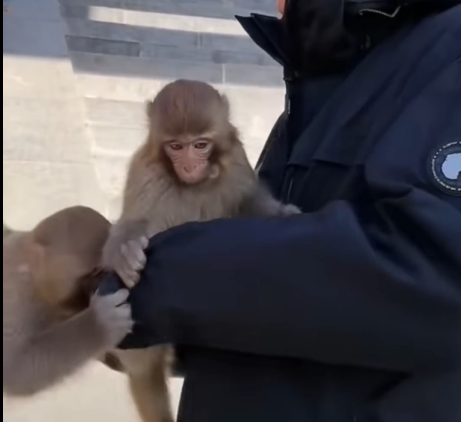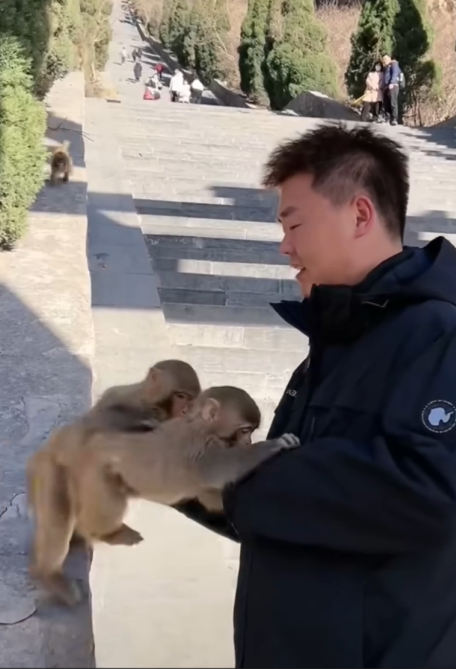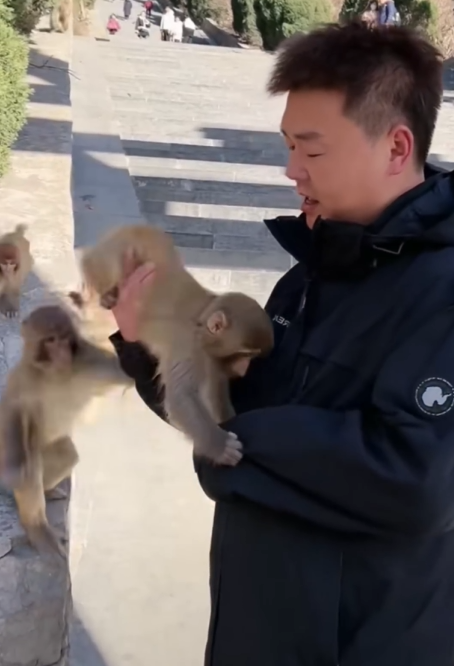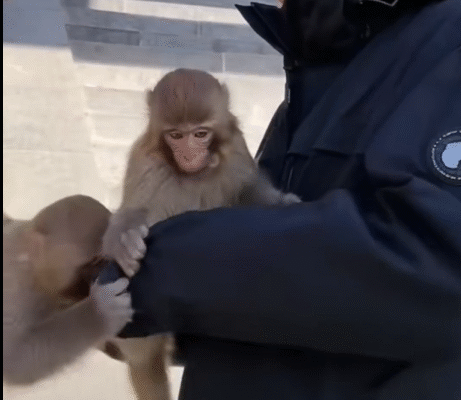
It was a bright and sunny morning in the forest, the kind where the light filters softly through the leaves and everything seems calm, peaceful, and inviting. Birds chirped cheerfully, a gentle breeze rustled the branches, and the distant gurgle of a stream created the perfect soundtrack for a quiet walk. Or so I thought.
I had been spending weeks observing a local troop of monkeys — a lively, playful group that had grown comfortable enough with my presence that I could get relatively close. They were a mix of adults, adolescents, and infants, each with distinct personalities. The younger monkeys, curious and mischievous, would leap around me, squealing and tumbling from branch to branch, while the older ones watched carefully, occasionally issuing stern warnings to keep the youngsters in line. For the most part, my interactions had been peaceful and entertaining. I had even shared some fruit with them, and a few monkeys had come surprisingly close to accept it from my hands.
But I had never experienced the full force of their protective instincts — until that fateful day.
I was wandering near a dense cluster of trees where one particularly small and adorable infant monkey had been playing. Its tiny limbs were clumsy, its squeaks high-pitched and endearing, and its curiosity endless. I had been observing from a distance, taking notes and snapping photos when I noticed the mother nearby. She was a striking figure: larger than most of the adults, with fur that glimmered golden in the sunlight and sharp, watchful eyes. From the moment she noticed me near her baby, I could sense her tension. Her tail flicked impatiently, her ears angled forward, and she let out a low, warning chitter that I had learned to recognize as the sign of a monkey who meant business.
I froze, hoping she would settle down, assuming that staying calm would prevent any escalation. But she had other plans. The mother monkey slowly started advancing toward me, her gaze fixed on her infant, who was blissfully unaware of the looming danger. My heart raced. I knew from previous experience that monkeys could be protective, but I hadn’t fully grasped just how far they would go to defend their young.
At first, it was subtle. She stomped a foot on the ground, making a sharp, authoritative sound. Then came the vocalizations — loud, rapid-fire chattering that echoed through the trees. I tried to back away slowly, speaking softly in an attempt to calm her. But she interpreted my movement as a potential threat. Suddenly, she launched herself at me, moving faster than I could anticipate. Her small but powerful body collided with mine, and I felt the force of her protective instincts firsthand.
It wasn’t a vicious attack in the sense of malice; it was pure maternal defense. Her teeth bared slightly, her claws extended, and her eyes were laser-focused on protecting her baby. I flinched instinctively, trying to maintain my balance as she swiped at my arm. I could feel the slight scratch of her nails, but thankfully nothing serious — it was more about the warning than causing harm. Still, the adrenaline coursing through me was immediate and intense.

The infant, realizing something was happening, squealed and clung tightly to its mother. I could see the bond between them in every movement, every glance, and every sound. The mother’s aggression was entirely for her baby’s safety. She was a whirlwind of motion, circling, swiping, and chattering, making it abundantly clear that I had overstepped an invisible boundary.
I slowly tried to retreat, holding my hands out in a non-threatening manner. The mother continued to follow, never taking her eyes off me, and never leaving her baby unprotected. It was a tense standoff: her maternal instincts versus my curiosity and desire to observe. Eventually, I realized that words, gestures, and apologies would not immediately dissolve her instinctual response. All I could do was remain calm, show no aggression, and slowly put distance between myself and the mother-infant pair.
As I inched backward, she continued her defensive display. She would dart forward, then circle back, chittering loudly. Her agility was remarkable; she moved with precision and purpose, each motion calculated to ensure her baby remained safe. It was a masterclass in maternal instinct and animal intelligence. I had read about such behavior before, but experiencing it firsthand was entirely different. The raw determination in her eyes, the power in her tiny but mighty body — it was humbling.
After what felt like an eternity, I finally managed to put enough space between us. I stopped, crouched slightly to appear less threatening, and slowly watched from a safe distance. The mother settled back slightly, her posture relaxing, though she kept one eye on me. The infant clung to her tightly, peeking out occasionally but remaining safe in her protective embrace. I exhaled, realizing I had learned a valuable lesson in respect, boundaries, and the intensity of parental care in the animal kingdom.
The rest of the day was quieter. I observed from afar, making sure never to approach that mother or her infant again. Interestingly, the rest of the troop seemed unaffected, going about their usual activities: playing, grooming, and foraging. Some younger monkeys seemed almost amused by my near-attack, squeaking and leaping around as if to say, “You’re learning the rules now, human!” It was a moment of both humor and humility — a reminder that in the wild, respect for boundaries is not optional.
Reflecting on the experience, I realized that being attacked by a protective mother monkey was not just about physical danger. It was a profound encounter with instinct, loyalty, and love. The mother’s behavior demonstrated the depth of animal parenting: her priority was entirely her baby’s safety, and no potential threat — even a well-meaning human — would be tolerated near her offspring. Her aggression was not anger but a demonstration of care, vigilance, and natural defense mechanisms honed over thousands of years of evolution.

I also learned the importance of observation skills. The subtle signs — the low chittering, the tail flicks, the fixed gaze — were all warnings I had initially underestimated. Animals communicate constantly, and understanding their language is crucial for coexistence. That day, the mother monkey taught me more about communication, boundaries, and respect than any book or video could.
By evening, the mother had resumed her usual activities, carrying her infant gently through the trees, foraging for fruits and leaves. I kept my distance, feeling both awe and gratitude for the lesson she had imparted. Her determination, her agility, and her unwavering love were a reminder of the complexity and beauty of animal behavior.
Finally, as the sun began to set and the jungle grew quieter, I made my way back to camp. My arm bore a few scratches — minor, but a clear memento of my encounter. More importantly, my mind was filled with admiration for the mother monkey and her incredible instincts. I had come expecting to observe, to take notes, and perhaps to enjoy some playful interactions. Instead, I had witnessed the raw power of maternal instinct, the courage of a mother defending her child, and the complex intelligence that drives animal behavior.
That day became a story I would never forget. I recounted it to fellow researchers and friends, emphasizing not the fear, but the awe. It was a humbling reminder that the animal world operates on rules, instincts, and bonds that are deeply ingrained and profoundly important. For every playful monkey, there is a guardian; for every mischievous act, there is a consequence; and for every curious human, there is a lesson waiting to be learned.
Finally getting attacked by a protective mother monkey was a frightening, thrilling, and eye-opening experience. It taught me respect, patience, and the power of instinctual love. It also reminded me, with a hint of humor, that the wild is unpredictable, and that sometimes, even well-intentioned humans can find themselves on the wrong side of a tiny but mighty force of nature.
From that day on, whenever I watched monkeys — especially mothers with their infants — I carried a newfound appreciation. Their protective instincts, intelligence, and emotional depth were awe-inspiring. And though I hoped never to be on the receiving end of such an attack again, I knew that it had been one of the most valuable lessons of my life: a lesson in humility, empathy, and the incredible power of a mother’s love.



